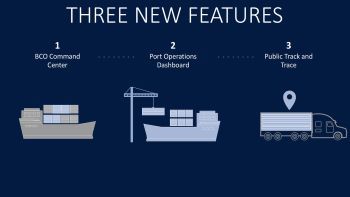The Long Beach Board of Harbor Commissioners on Monday received an update about the capabilities of the Supply Chain Information Highway, a robust digital tool created to maximize the efficiency and visibility of cargo shipments moving through the Port of Long Beach.
Now in its second phase of development, the Supply Chain Information Highway is undergoing field testing to refine its ability to deliver aggregated data that will help logistics partners to better plan, schedule and track cargo movement in real time from origin to destination.

“The Supply Chain Information Highway maximizes efficiency by enabling our industry partners to schedule and plan for the arrival of cargo through our Port, as well as expedite deliveries to consumers and retailers,” said Long Beach Harbor Commission President Sharon L. Weissman. “This is truly a game-changer for the 200,000 shippers who move their goods through the Port of Choice.”
All six marine terminals at the Port are using a beta version of the Supply Chain Information Highway. Three new features were introduced at a public meeting of the Board of Harbor Commissioners on July 24, features created to significantly enhance the digital platform’s functionality while meeting the key objectives this initiative was designed to achieve:
• A dashboard designed for beneficial cargo owners allows customers to access information about the location of their containers within the Port complex, highlighting which containers have arrived, which are undergoing inspection by the U.S. Customs and Border Protection, and which are ready to be picked up.
• A public “track and trace” page allows users to access the most up-to-date information about the status of containers moving through the Port of Long Beach. After inputting a unique tracking number, the user will be presented with a detailed list tracing every step the container goes through from the time it is loaded onto a vessel until it is unloaded on the docks.
• A public port operations dashboard that contains much of the information currently found in the Port’s Weekly Advance Volume Estimate, or WAVE Report, including projected container volumes, vessel calls and turn times for trucks accessing marine terminals.
The Supply Chain Information Highway is anticipated to be compatible with similar data-sharing platforms across the maritime logistics industry, with a goal of using the tool at other seaports across the nation. The Port of Oakland, the Northwest Seaport Alliance, the Utah Inland Port Authority, PortMiami, the South Carolina Ports Authority and the Port of New York/New Jersey have previously agreed to collaborate with the Port of Long Beach and participate in the project.










